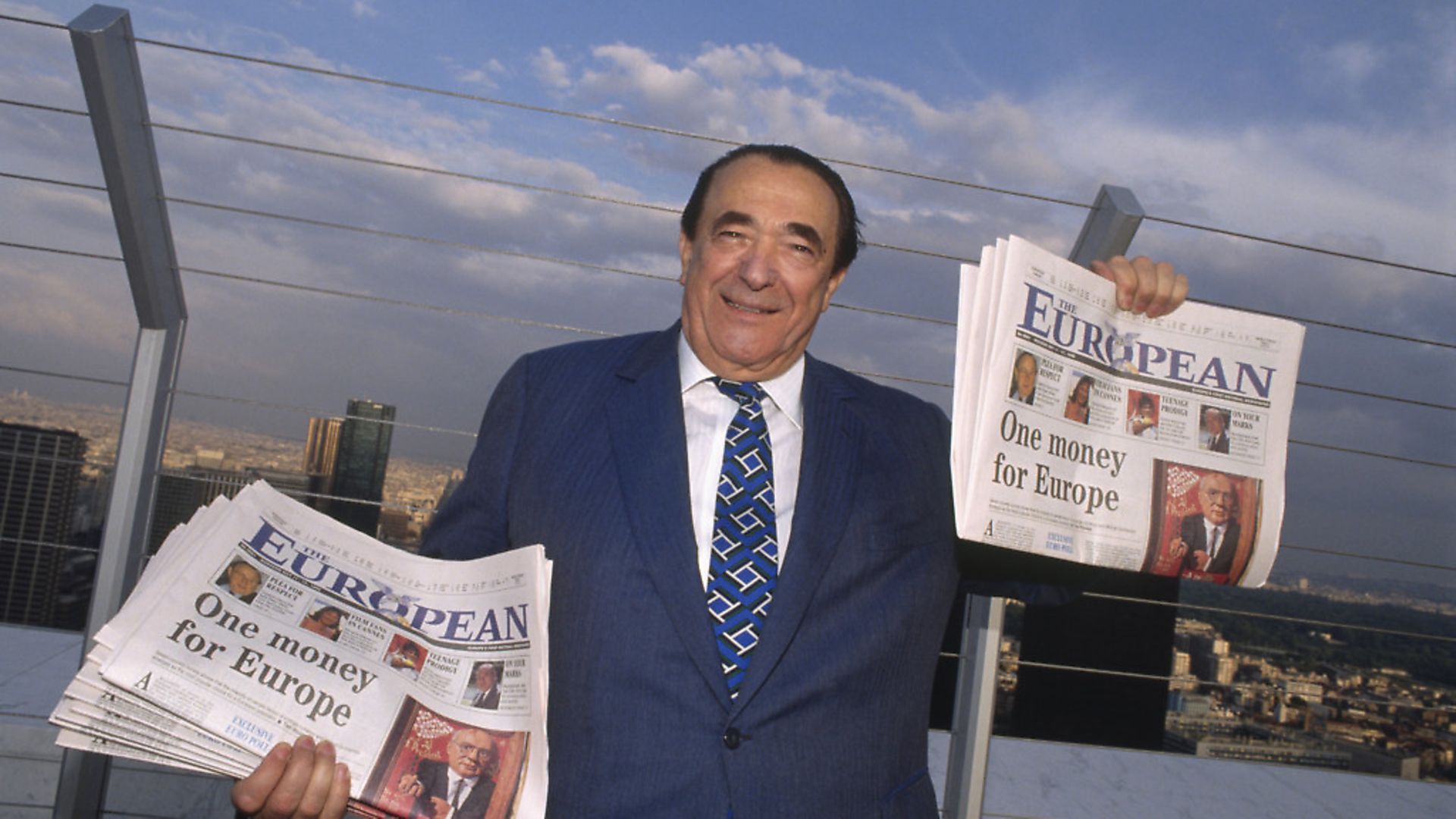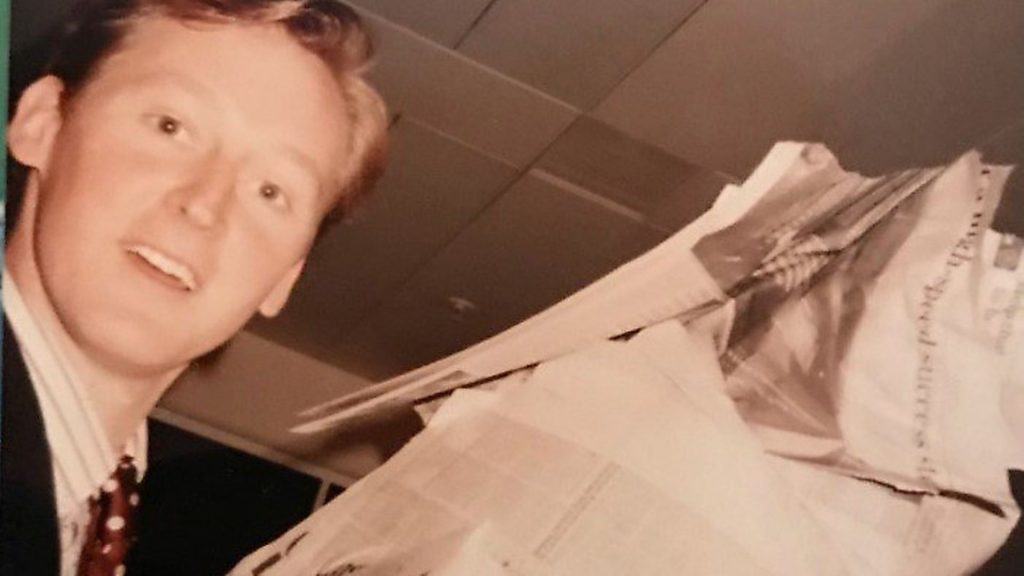
MICK O’HARE finds some familiar themes emerging in the first edition of The New European’s print predecessor.
You can admit it. Many of you may have never stopped to wonder why this newspaper (presuming you are holding the print edition) had the word ‘New’ in its title, had you? And if you had, you probably thought it was something to do with progressive politics… maybe the hope that we’d all become pro-European anew once the horror of Brexit was revealed to an aghast population. Wishful thinking? Well, we’ve just found out a bit more about that haven’t we?
But back to the title. The reason the ‘New’ is there is far more prosaic. It’s because there was once an ‘old’ European.
Yes, in the heady days when the fall of the Berlin Wall and the demise of eastern European communism gave great fervour to hopes for pan-European unity in perpetuity, the European – which has no link to the present title – was launched on the back of this new-found optimism.
It was published by Robert Maxwell, wartime Czech exile, media proprietor, former MP, and he of the pilfered Daily Mirror pension fund, although at that time little was known about the forthcoming scandal which would emerge following his death.
Like the current paper, the European was also a weekly. The first edition was a broadsheet with 64 pages plus a culture supplement, published on May 11, 1990. Flicking through a copy of that issue now, you cannot fail to be struck by the ironies, paradoxes and parallels with today’s publication.
For its launch, the European had commissioned a poll across the continent asking any number of questions regarding Britain’s role in Europe. It was around the time that the former communist states of eastern Europe were casting their attention westwards and towards possible membership of what then was still called the European Community.
Were we more open-minded back then because a full two-thirds of Britons questioned wanted full integration of these nations into the EC? We were also keen on a single currency for the bloc. It’s right there on the front page – honest!
Inside, are countless more stories pertinent to today’s debate, and the current Brexit debacle we are now enduring, and all covered in a swathe of optimism that broadly accepted that the European Community was both a force for good on our continent and also the kind of organisation that Britain would be crazy to discard membership of. Polyglots abounded, and parts of the newspaper could almost be slipped into today’s New European without anybody noticing.
There’s a column from Michael Heseltine headlined “The vision of unity that must not fail” (you can’t accuse the man of inconsistency, that’s for sure) and a story about the founder of the Democratic Unionist Party, the late Ian Paisley, demanding that soon-to-be reunified Germany declare itself a Protestant state. As we know from recent experience, the DUP is prepared to put clout above perspective.

But what you won’t find in the contemporary European title is a personal endorsement from the prime minister of the day. Perish the thought. But Margaret Thatcher, who is so frequently invoked by the Brexit-supporting press as a totem of everything they are striving for, penned a welcome message especially for The European’s first issue.
Here are a few choice sentences. “If ever an era in our history created an opportunity for the European newspaper, this is it. The Iron Curtain and the Berlin Wall have collapsed. The spirit of ever-closer co-operation between member states of the European Community – surely the meaning of the jargon term ‘political union’ – is abroad. We are building on it. The success of the European Community and the prospect of a single internal market is proving a magnet for so many countries. It is a time for opportunity.” She was even making encouraging noises about the possibility of Turkey joining. Positivity for the project was the leitmotif running throughout her message. It doesn’t sound like she was envisaging Britain’s departure from the EC anytime soon. It would unthinkable to imagine anybody still a member of the parliamentary Conservative Party writing such an article today. And when one considers what a lightning rod for the most facile Brexiteer ambitions the former prime minister has since become, do the likes of Jacob Rees-Mogg and Mark Francois ever stop to ponder how far removed from Thatcher’s pragmatism they have become? Do they ever wonder what on earth they have done? Better not tell them that the idea of a “United States of Europe” was first invoked by Winston Spencer-Churchill.
Elsewhere the newspaper reports extensively on the slow disintegration of the Soviet Union under its reforming general secretary Mikhail Gorbachev. It survived until the last days of 1991 but the Baltic states of Lithuania, Latvia and Estonia were already attempting to cede from the USSR. And dissent was growing fast. “We praise the Russian Army that liberated us from fascism, but why did they stay so long?” asked Valdis Berzins, the foreign editor of an evening newspaper in Riga. All eyes were on Gorbachev. And we all know where the Baltic states reside politically now…
And in Yugoslavia, the previously communist nation that had yet to dissolve into the dreadful ethnic conflict that would presage its breakup, Croatia’s new leader Franjo Tudjman declared his populist nationalist credentials in a hint of what was to come. “Like Mr Bush, Mrs Thatcher and Chancellor Kohl I am a Christian who believes in democracy,” he pronounced. “If they are right wing, so am I.” Tudjman was proposing that Yugoslavia become a federacy of the six states from which it was comprised, Croatia, of course, being one of them. He had fought a lengthy political campaign against Yugoslavia’s long-time, but now deceased, communist leader Josep Tito (twice being jailed) and had been accused by the regime of “pro-Nazi nationalism”. Almost one year later Croatia and Slovenia would declare independence. A violent denouement was just around the corner…
A couple more things catch the eye from the European’s pages, reading from the perspective of 2019. In a tiny story on a corner of page 15 it was reported that an American tycoon called Donald Trump had just purchased the Amels shipyard near Amsterdam.
Apparently his new yacht was being built there and “he liked the ship so much, he bought the company” he told reporters, while simultaneously stealing somebody else’s well-crafted line. And on the back page was a report that television was taking control of football, driving away true fans, raising costs and making sure only the big clubs could qualify for the final stages of European tournaments. Plus ça change…
And one last thing. The weather map shows that it was raining in Britain. Natch!
After Maxwell’s death in an apparent boating accident in November 1991 the newspaper was bought by the Barclay brothers, current owners of the Telegraph. And you thought the irony had peaked earlier in the story…. In 1996 they installed Andrew Neil as editor. He would be succeeded by Gerry Malone under whose tenure the European finally ran out of steam in December 1998 (presumably the Barclays’ Euroscepticism had taken root by then).
So it survived eight years… The New European is almost halfway there already. And with more battles set to come its positive European message is as essential now as it was three decades ago.
A EUROPEAN MAN
The New European columnist TIM WALKER, who worked on the original title as its diary editor, looks back on some high times and hints of scandal…
There was a gigantic banner in the European’s newsroom the night we launched emblazoned with the words “WELL DONE, BOB”. Someone – it was not I – had inserted an L so it read “BLOB”.
I doubt I’d ever laughed so much than during my years on the paper. Money was no object – whose money it was I now wonder – and one of my first jobs was to head to Monaco to interview Prince Albert. I arrived by helicopter, stretched the assignment out to a full week, and learnt, among other things, to paraglide, before retiring each night, after some sumptuous dinners, to my enormous suite at the Hôtel Hermitage.
These were the years when Maxwell was beginning his decline and fall, but launching this newspaper was the noble act of an ignoble man. It was only after his death, and the paper went into administration, that the staff were sent letters by the accountants Arthur Andersen that showed where the money had been going. I was bemused to find that, although I’d believed I was the European’s diary editor, the job had been officially listed in the accounts as belonging to a woman now much in the news, Ghislaine Maxwell. Very handsomely she’d been paid for doing it too, even though she’d never contributed a single word.










